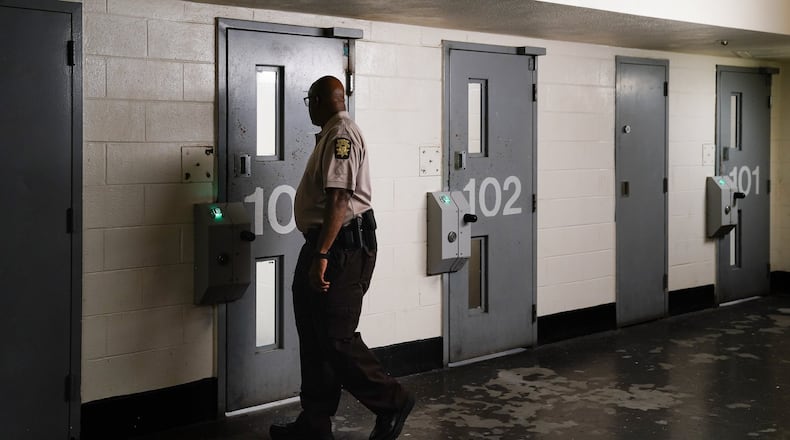A leading expert on infectious diseases inside detention centers said Wednesday that, barring immediate action, the number of Fulton County Jail inmates infected with COVID-19 “will overwhelm the county’s available hospital and intensive care beds.”
“This is a preventable disaster that can be avoided, but only by acting with extreme speed,” said Robert Greifinger, who served as medical monitor during the federal government’s 11-year oversight of the jail ending in 2015.
Sixteen inmates, all men, have been infected with the disease caused by the coronavirus since March 23 , when the first case was announced. Six more were tested Wednesday and are awaiting results. All but two of the infected men are being treated inside the Rice Street jail, said Fulton Sheriff’s Office spokeswoman Tracy Flanagan.
The 14 inmates still at the jail are showing signs of improvement, Flanagan said.
“Their fevers broke and their prognosis is positive,” she said.
But one of the men who remains said treatment is virtually non-existent.
The infected inmates are housed, two to a cell, in isolation on the first floor of the jail, Nathaniel Nix told his attorney, Manny Arora.
“I’m sitting here waiting to die,” said Arora, quoting his client.
Flanagan disputed many of Nix’s claims, saying, “They are certainly receiving treatment.”
“There’s no cure or specific treatment for the coronavirus COVID-19 as you are aware,” she said. “Doctors are caring for the patients as they would persons who are diagnosed with influenza.”
She hailed the work done by the jail’s medical provider, NaphCare, singling out one nurse practitioner who volunteered to work with the infected inmates.
“She’s there five days a week with other colleagues who are caring for and monitoring these patients,” Flanagan said. “That’s just one example of the commitment by this team to provide the best care.”
On Monday, Arora filed a motion to reconsider bond for Nix, indicted in November for murder. His attorney notes he was indicted as a “party to the crime” and is not alleged to have shot the man killed following a nightclub altercation.
“Because the Defendant is among the vulnerable population at higher risk of getting very sick from this illness, he should not be detained before trial,” Arora wrote the court.
The motion was denied.
Arora said Nix began feeling ill last week but wasn’t tested for COVID-19 until his temperature reached 106 degrees. (Flanagan said the highest temperature registered by an infected inmate was 103.1)
Nix’s fever has since subsided but Arora said pre-existing conditions, including a serious head injury sustained in a 2008 shooting and high blood pressure, make his client especially susceptible to worst of the virus.
Greifinger said many more inmates are at risk unless the Fulton jail dramatically reduces its population.
As of Wednesday, Fulton had released 52 non-violent offenders to mitigate overcrowding, Flanagan said. There are 2299 people currently being held at the jail, about 200 below the recommended capacity.
To stop the virus’ spread, Greifinger said the jail should hold no more than 1500 inmates.
“When you have people crowded in confined spaces, the risk of transmission is really high,” he said.
Greifinger said inmates with medical risk factors should be prioritized for release, followed by nonviolent offenders.
“This isn’t just for the inmates’ sake. It’s also for the safety of the staff,” he said. “If they are exposed then their families are exposed, their elderly parents ...”
The situation couldn’t be more dire, Greifinger said Wednesday.
“Every hour inmates are not released is going to exact a cost in human life,” he told the AJC.
State and local officials have largely resisted calls to release substantial numbers of prisoners early, citing public safety concerns.
The Georgia Board of Pardons and Paroles announced Tuesday it has started reviewing some inmates for early release. To be considered for the early release, the inmates must be within 180 of completing their prison sentences or within 180 days of their tentative parole date, according to the board.
That could lead up to 200 inmates being released in the next 30 days -- far short of the number needed to curb the spread of the coronavirus, health advocates say.
About the Author
The Latest
Featured



